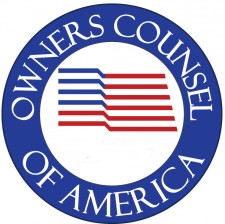
The Owners' Counsel of America (OCA) joined Cato, NFIB Small Business Legal Center and other property rights groups to file an amici curiae brief with the U.S. Supreme Court supporting the property owner in an inverse condemnation case concerning New York's High Line park.
Jacksonville, Florida, November 21, 2016 (Newswire.com) - The Owners’ Counsel of America (OCA) has joined with a number of property rights advocates to file an amici curiae brief with the United States Supreme Court in a rails-to-trails inverse condemnation case originating in New York City. Amici urge the Supreme Court to grant review of Romanoff v. United States, 815 F.3d 809 (Fed. Cir. 2016) and reverse the lower court judgment.
This rails-to-trails takings case arises from the landowner’s appeal of a federal appellate court decision concluding that an easement granted to New York Central Railroad in 1932 for “railroad purposes” was broad enough to encompass future recreational use of the elevated railroad. (See Romanoff Equities, Inc. v. United States, No. 15-5034 Opinion at 12.) The case involves the conversion of an abandoned elevated rail line to the High Line public park on Manhattan’s West Side. An easement was granted to New York Central Railroad by a previous landowner for the construction of an elevated freight line. When the railroad abandoned use of the line, the City of New York converted it to a public recreational park.
The right of citizens to be secure in their property as guaranteed by the Fifth Amendment is undermined when courts do not follow established property and common law principles.
Jeremy P. Hopkins, OCA Virginia Member
In Romanoff Equities, Inc. v. United States, No. 15-5034 (Fed. Cir. Mar. 10, 2016), the federal appellate court determined that the words in the original easement "for railroad purposes and for such other purposes as the Railroad Company...may...desire to make" indicate that the easement was a "general" easement which allowed the railroad company to not only use the easement for rail transportation, but for any other use it desired. The Federal Circuit, therefore, concluded that upon the railroad’s abandonment of the line, ownership did not revert back to the landowner. Instead, the railroad was permitted to transfer the easement to the City for use as a public park.
“The Court of Federal Claims determined that the Romanoff family was not entitled to compensation when the railroad abandoned use of the elevated line and transferred its easement rights to the City of New York,” explained Robert H. Thomas, Esq., a Director with Damon Key Leong Kupchak Hastert in Honolulu. “By doing so, the court permitted the Romanoff family’s property, which its predecessors conveyed for railroad purposes, to be impressed into public service as a recreational space in violation of the Fifth Amendment’s just compensation clause.”
OCA joined the National Federation of Independent Businesses Small Business Legal Center, the Cato Institute, law professors Paula Franzese and James Ely, the National Association of Reversionary Property Owners, the Property Rights Foundation of America, and the Citizen Advocacy Center in filing the brief, which was principally authored by OCA Hawaii Member Robert Thomas and Cato’s Ilya Shapiro. In the brief, amici argue that words have meaning, especially when used in a document granting an interest in real property.
The brief presents four arguments. First, the brief asserts that property rights are the basis of a free society and the foundation upon which all civil rights stand. Second, amici argue that under the principle of judicial federalism the federal court should have asked New York’s highest court to decide the scope of the easement under New York law. Third, the federal courts violated property law principles of certainty and predictability by concluding that the words in the easement for railroad use meant something other than what is written. Fourth, when a court of national jurisdiction considers a novel or unsettled issue of state law, the court should not attempt to guess how the state’s highest court would decide the issue, but rather certify the question to the state’s highest court.
“The right of citizens to be secure in their property as guaranteed by the Fifth Amendment is undermined when courts do not follow established property and common law principles,” stated OCA Virginia member Jeremy P. Hopkins, Esq., who also signed the brief. “It is an established principle of property law that an easement is limited to a special purpose, not a general use. An easement to do anything the grantee wants for as long as it wants isn’t really an easement, it is a grant of fee simple title by another name.”
About Owners’ Counsel of America
The Owners’ Counsel of America (OCA) is a nationwide network of experienced eminent domain lawyers dedicated to protecting the rights of private property owners large and small, locally and nationally, and to advancing the cause of property rights. The condemnation attorneys affiliated with OCA are in private practice in nearly every state and represent private owners against federal, state, and local governments, utilities, transportation and redevelopment authorities and other agencies that may be armed with eminent domain power. For more information or to locate a property rights lawyer in your state, visit www.ownerscounsel.com.
Source: Owners' Counsel of America
Share:
